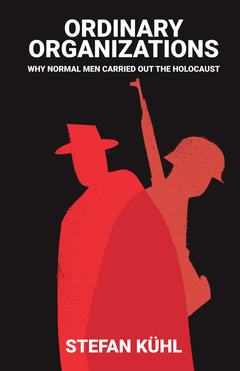Ordinary Organisations Why Normal Men Carried Out the Holocaust
Auteur : Kühl Stefan

During the Holocaust, 99 percent of all Jewish killings were carried out by members of state organizations. In this groundbreaking book, Stefan Kühl offers a new analysis of the integral role that membership in organizations played in facilitating the annihilation of European Jews under the Nazis.
Drawing on the well-researched case of the mass killings of Jews by a Hamburg reserve police battalion, Kühl shows how ordinary men from ordinary professions were induced to carry out massacres. It may have been that coercion, money, identification with the end goal, the enjoyment of brutality, or the expectations of their comrades impelled the members of the police battalion to join the police units and participate in ghetto liquidations, deportations, and mass shootings. But ultimately, argues Kühl, the question of immediate motives, or indeed whether members carried out tasks with enthusiasm or reluctance, is of secondary importance. The crucial factor in explaining what they did was the integration of individuals into an organizational framework that prompted them to perform their roles.
This book makes a major contribution to our understanding of the Holocaust by demonstrating the fundamental role played by organizations in persuading ordinary Germans to participate in the annihilation of the Jews. It will be an invaluable resource for students and scholars of organizations, violence, and modern German history, as well as for anyone interested in genocide and the Holocaust.
Introduction page 1
1 Beyond “Ordinary Men” and “Ordinary Germans” 18
1.1 The failure of easy answers 21
1.2 From the search for motives to the presentation of motives 31
1.3 The motivation of organization members 36
2 Identification with the Goal 44
2.1 The formation of an antisemitic fictional consensus 46
2.2 How ideological indoctrination secured an antisemitic fictional consensus 52
2.3 From “impassive acceptance” to “active participation” 55
3 Coercion 58
3.1 Forced recruitment and barriers to exit 61
3.2 Avoiding the membership issue in coercive organizations 65
3.3 The limits of leeway 68
3.4 The freedom in coercion 71
4 Comradeship 74
4.1 The pressure of comradeship and the formation of informal norms 75
4.2 Levels in the formation of comradeship 78
4.3 How are comradeship norms enforced? 81
4.4 Mobilizing comradeship by granting leeway 85
5 Money 88
5.1 The function of regular remuneration for the battalion members 89
5.2 Legalized enrichment through the dispossession of the Jewish population 91
5.3 Enrichment beyond official forms of remuneration and reward 95
5.4 The functionality of misappropriation 99
6 The Attractiveness of Activities 102
6.1 Inhibitions against killing and organizational strategies for overcoming them 104
6.2 The production of motives: dehumanizing the victims 108
6.3 An organizational culture of brutality 111
7 The Generalization of Motives 114
7.1 The different ways of presenting personal engagement 115
7.2 Managing one’s self-presentation 120
7.3 The separation between goals and motives 124
8 From Killers to Perpetrators 129
8.1 The legalization of the state’s use of violence 135
8.2 Using violence in the gray zones of legality 139
8.3 The shift in the concept of law under the Nazis 148
8.4 Facilitating killing by legalizing it 152
9 The Normality and Abnormality of Organizations 153
9.1 Beyond the notion of “abnormal organizations” 155
9.2 The expansion of zones of indifference in organizations 159
9.3 Understanding organizations: conclusions 167
Appendix: The Sociological Approach and Empirical Basis 169
Archives 179
Notes 181
References 258
Index 306
Date de parution : 11-2016
Ouvrage de 300 p.
15.2x22.4 cm
Date de parution : 11-2016
Ouvrage de 300 p.
15.2x23.1 cm
Thème d’Ordinary Organisations :
Mots-clés :
Holocaust



